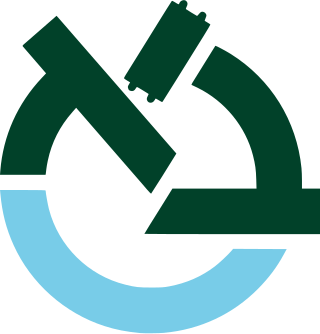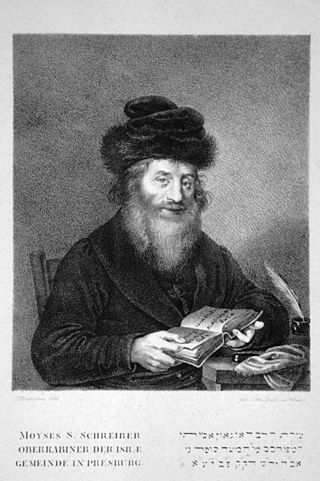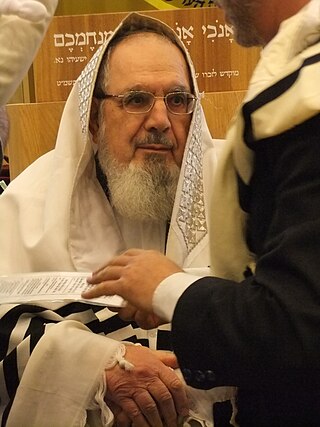Halakha, also transliterated as halacha, halakhah, and halocho, is the collective body of Jewish religious laws that are derived from the Written and Oral Torah. Halakha is based on biblical commandments (mitzvot), subsequent Talmudic and rabbinic laws, and the customs and traditions which were compiled in the many books such as the Shulchan Aruch. Halakha is often translated as "Jewish law", although a more literal translation might be "the way to behave" or "the way of walking". The word is derived from the root which means "to behave". Halakha not only guides religious practices and beliefs; it also guides numerous aspects of day-to-day life.

In Judaism, the Seven Laws of Noah, otherwise referred to as the Noahide Laws or the Noachian Laws, are a set of universal moral laws which, according to the Talmud, were given by God as a covenant with Noah and with the "sons of Noah"—that is, all of humanity.

Bar-Ilan University is a public research university in the Tel Aviv District city of Ramat Gan, Israel. Established in 1955, Bar Ilan is Israel's second-largest academic university institution. It has 20,000 students and 1,350 faculty members.

The Soloveitchik dynasty of rabbinic scholars and their students originated the Brisker method of Talmudic study, which is embraced by their followers in the Brisk yeshivas. It is so called because of the Soloveitchiks' origin in the town of Brisk, or Brest-Litovsk, located in what is now Belarus. Many of the first Soloveitchik rabbis were the official rabbis of Brisk, and each in turn was known as "the Brisker Rov". Today, Brisk refers to several yeshivas in Israel and the United States founded by members of the Soloveitchik family, including the yeshivas of R’ Avraham Yehousua Soloveitchik and the late R’ Dovid Soloveitchik, among others.

Moses Schreiber (1762–1839), known to his own community and Jewish posterity in the Hebrew translation as Moshe Sofer, also known by his main work Chatam Sofer, Chasam Sofer, or Hatam Sofer, was one of the leading Orthodox rabbis of European Jewry in the first half of the nineteenth century.
Stylometry is the application of the study of linguistic style, usually to written language. It has also been applied successfully to music, paintings, and chess.

Mercaz HaRav is a national-religious yeshiva in Jerusalem, founded in 1924 by Ashkenazi Chief Rabbi Abraham Isaac Kook. Located in the city's Kiryat Moshe neighborhood, it has become the most prominent religious-Zionist yeshiva in the world and synonymous with Rabbi Kook's teachings. Many Religious Zionist educators and leaders have studied at Mercaz HaRav.

Nachum Eliezer Rabinovitch, born Norman Louis Rabinovitch, was a Canadian-Israeli Religious Zionist rabbi and posek. He headed the London School of Jewish Studies from 1971 to 1982, and the hesder yeshiva Birkat Moshe in Ma'ale Adumim from 1982 until his death.
The United Religious Front was a political alliance of the four major religious parties in Israel, as well as the Union of Religious Independents, formed to contest the 1949 elections.

Ecclesiastes Rabbah or Kohelet Rabbah is an aggadic commentary on Ecclesiastes, included in the collection of the Midrash Rabbot. It follows the biblical book verse by verse, only a few verses remaining without commentary.

The Baraita on the Thirty-two Rules or Baraita of R. Eliezer ben Jose ha-Gelili is a baraita giving 32 hermeneutic rules, or middot, for interpreting the Bible. As of when the Jewish Encyclopedia was published in 1901–1906, it was thought to no longer exist except in references by later authorities. However, it was discovered in 1933 by H. G. Enelow, who published it in his "Mishnat Rabbi Eliezer," and in 1947 it was published again in Margaliot's edition of Midrash Hagadol to Genesis.
Plagiarism detection or content similarity detection is the process of locating instances of plagiarism or copyright infringement within a work or document. The widespread use of computers and the advent of the Internet have made it easier to plagiarize the work of others.
Moshe Meiselman is an American-born Orthodox rabbi and rosh yeshiva (dean) of Yeshiva Toras Moshe in Jerusalem, which he established in 1982. He also founded and served as principal of Yeshiva University of Los Angeles (YULA) from 1977 to 1982. He is a descendant of the Lithuanian Jewish Soloveitchik rabbinic dynasty.

Avraham Ravitz was an Israeli politician and member of the Knesset for Degel HaTorah, which forms part of the United Torah Judaism alliance.

Abraham Diskin is an Israeli political scientist at the Hebrew University of Jerusalem, and a professor at the Interdisciplinary Center in Herzliya.
The Kohelet Policy Forum is a conservative, libertarian, right-wing Israeli nonprofit think tank established in 2012 and run by founder and chair Moshe Koppel alongside Avraham Diskin, Avi Bell and Eugene Kontorovich. Its goal is to influence government policies within Israel.
Shlomo Argamon is an American/Israeli computer scientist and forensic linguist. He is the associate provost for artificial intelligence and professor of computer science at Touro University.
Yedidia Stern is an Israeli jurist and legal scholar. He is an emeritus professor of law at Bar Ilan University and the president and CEO of the Jewish People Policy Institute.

Israel Ta-Shma (1936–2004) was a scholar of Talmud, broadly construed, who served as a professor at Hebrew University in Jerusalem.









